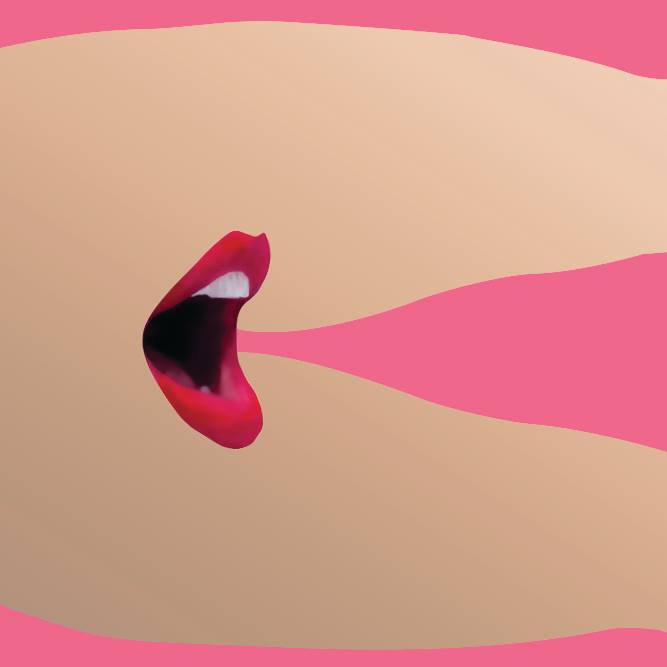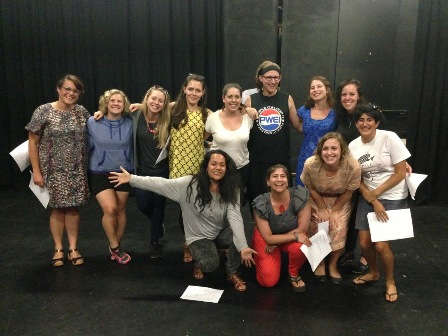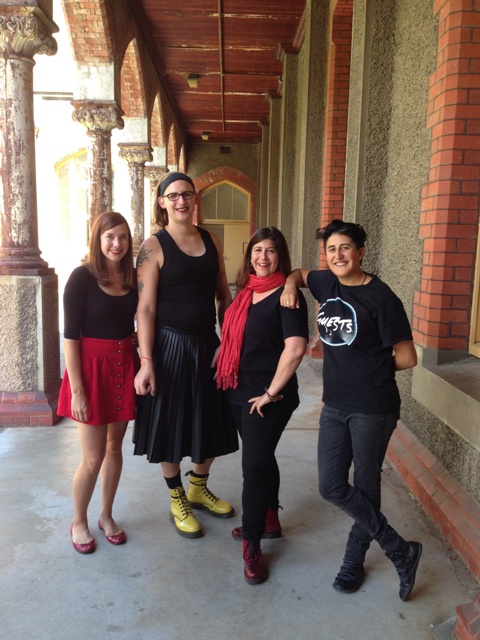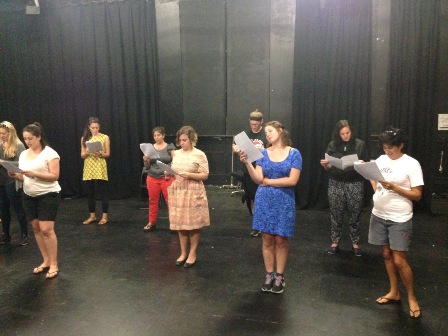v-day melbourne 2015: the vagina monologues

Eve Ensler’s still-controversial – and bloody brilliant – The Vagina Monologues has been performed in cities all over the world since its New York City debut in the mid ’90s. It has sparked conversation, debate, and revere, and this weekend, in honour of the grassroots social justice movement it inspired – V-Day – The Vagina Monologues is coming to Melbourne’s Abbotsford Convent.
We had a quick chat with Sheryl Cardozo – one half of the husband-and-wife duo responsible for bringing this irreverent, intimate and informative celebration of female sexuality to Melbourne – about the production, feminism, sexuality and, of course, vaginas.
Describe yourself in one word:
Passionate/hilarious. I know it’s two words. Verbose, maybe!
What is your feminist philosophy?
Fundamentally, my feminism is based on the belief that women need to be treated equally to men, while acknowledging that there are differences between the two. The simplicity of this approach, however, belies the nature of historical privilege that men have, as well as ignores the myriad differences in women’s experiences and the need to validate those and honour all experiences of people who identify as female all or some of the time.
What inspires you?
Young people – the future. There are so many clever young women (and men) doing amazing things to better the world. It gives me hope.
Tell me about the first time you read or saw a staging of The Vagina Monologues.
I was lucky to see the show in its premiere Off-Broadway run in ’96, with my mum (who I called mom in those days because I am a native New Yorker) and my sister. I was a recent uni grad and I was blown away by the concept of the show and the voices it gave to so many who have traditionally been silenced.
What is it about The Vagina Monologues that made you want to produce the show in Melbourne?
Even though the show is 20 years old, it still addresses a lot of issues that are relevant today. I think it approaches some challenging topics in a way that is disarming and non-threatening (if people can get past the title) and serves to educate both men and women about the various challenges of having – or desiring to have – a vagina.
And, given the epidemic of gender-based violence in Australia, I love the mission of V-Day, which is to use creativity to raise awareness and funds for local organisations working to eradicate violence against women and support those living in violent situations.
Tell us about the production.
The cast is made up of 17 amazing women from all over Melbourne. We represent suburbs from all sides of the city, as far south as Seaford, North-East to Eltham and Hurstbridge and West, to Yarraville, as well as inner suburbs on all sides. The cast ranges in age from 18-60+ and performance experience varies from a few who have worked professionally to some who have never before “trod the boards”. We have women who identify as straight and gay, as Cis* women and *trans women, Jewish women, Christian women, Atheist women, Anglo, Eastern European, Tamil, Polynesian. We have Australian, American and Irish nationals.

I’m especially thrilled that over 50% of the cast is women that I’m two or three or even four degrees separated from – the power of social media. We also have about 10 volunteers, both male and female, who are helping get the show up behind the scenes.
The venue – The Abbottsford Convent Oratory – is an especially fitting place for this show and we’re so grateful that they’re a supporting sponsor of the production. An aspect of the Convent history involves the internment of women, sometimes against their will, for various reasons, including perceived “immorality.” To me, it seems fitting that the space is now being used for an empowering piece about women, and we dedicate it to those women who suffered hardship in the convent’s previous life.
I wanted to make [rehearsals] as easy as possible for women to participate, so we only have one group rehearsal with the next one the dress rehearsal. I’ve then met with each woman on two occasions to practise her monologue. I’ve gotten to see quite a bit of the city. But I’m really looking forward to dress rehearsal so all these amazing women can see what they’ve all done together.
Which monologue resonates with you most? And why?
Oooh….good question, and I think my answer probably changes day to day. I identify with The Angry Vagina, because I get angry – especially when I think about gender based violence as well as everything from the societal pressures on women to look a certain way to the lack of access to reproductive health care and education that many women around the world experience.
I’m also moved by the finale, My Revolution is in the Body because it’s a call to action.
For all its praise, some elements of The Vagina Monologues have been criticised by feminists and non-feminists alike who’ve called the show, among other things, heterosexist, racist, and negative in its portrayal of male-female relationships and sexual encounters. How would you respond to such opinions?
That’s true about some controversy. First, I think the play needs to be respected in the context in which it was written, which was the early ’90s, by a middle class American white woman. So obviously, she’s going to have her experience reflected in the show. I know that Eve Ensler (the playwright) has made changes and additions to the piece as time has gone by – one notable example is the addition in 2006 (I think) of a piece about Trans* women, which evolved from a weekend Ensler spent with 20 Trans* women. I’m excited that we’ll be performing this piece with both Cis* and Trans* women.
As far as heterosexual encounters go, I agree that another piece – in addition to Because He Liked to Look at It – that celebrates all the men out there who are FOV’s (friends of vaginas) would be great, but the reality is that when 30% of the population experiences some kind of gender based violence in their lifetime, when asked to speak about vaginas, violence comes up.
The show is not (nor does it claim to be) all-inclusive about everything that happens to one that is vaginally related. For example, my current story, that of infertility, is not really represented and I suppose I’d love Ensler to create a monologue about women whose reproductive organs have let them down, and how that makes one feel in terms of their femininity and how society looks on us as “broken” or less than other women. So I understand those women who feel their voice is not presented in the show and certainly respect their opinion.
Finally, controversy gets people talking about things, so I’m all for anything that furthers the conversation about gender roles and gender based violence. I’d encourage folks to come and form their own opinions!

Eve Ensler first staged The Vagina Monologues in NYC in the mid ’90s and it has been performed the world over since. Why do you believe it has been so successful?
I think Ensler tapped into a desire women have to speak about their vaginas. The word still causes unease, even today (I can tell when I tell people what I’m doing!). I think around the world there is a need for women to be heard, for their stories to be told, for their experiences to be legitimised. The nature of the show also makes it fairly easy to mount amateur productions – there’s no need for super fancy sets (though ours, while budget friendly, is also awesome thanks to Tim Denshire-Key and Roisin Lynagh), massive lighting equipment, etc. So the convenience of doing it has helped. And I think Ensler did more than create a play. She created, quite literally, a movement (One Billion Rising) and women worldwide are committed to making this century the one where women can exist in the same equal space as men.
Rumour has it that the folk at Facebook didn’t allow you to raise awareness of the event with a paid advertisement because they assumed you were attempting to sell “adult services”. What is it about the word “vagina” that people find so offensive? And what do you think we can do to eliminate the stigma associated with female sexuality?
Yes, we did have a misunderstanding with Facebook (they came around after we enlightened them). Vagina is a threatening word because it reminds people that women are holistic beings, with an organ that both creates life and pleasure. Society prefers to deconstruct us and separate parts. By using a non-biological term – pussy, for example – it separates that piece of us and makes it more controllable.
I think everyone should try to find a way to insert the word “vagina” into their daily conversations (one way to do that is, when asked, ‘What are you doing this weekend?’ you can reply, ‘I’m going to see the Vagina Monologues’.) Seriously, I think acceptance of women’s sexuality is contingent on acceptance of women as whole powerful beings. By positing our sexuality as a threat, it’s another way to attempt to control and until we do rise up, people will still giggle when they hear the word (or shudder) in a way they don’t when they hear “penis”.
What are the most “creative” euphemisms you’ve heard for “vagina”?
This production has introduced me to some unique Australian terms. “Corned Beef Curtain” is one that’s so gross it’s funny. And I also love Map of Tassie, if only because it helps with my Tasmanian geography a bit! But I’m partial to poontang and punani.
Do you have your own “vagina monologue”?
What do you think is answering these questions? My vagina has had 44 years of experiences to lend to its monologue, but if I were to create one now I think it would be on the subject I alluded to earlier: infertility. That and the joy of having a male partner who enjoys celebrating vaginas so much his production company is producing this show! (Shout out to Artsman).
If your vagina could speak, what would it say?
Today it would tell you to buy tickets at www.vdaymelbourne2015.com
But in general, it would say, ‘Hi, how are you? Tell me about yourself. Lets get to know each other a bit!’
If your vagina got dressed, what would it wear?
I’d like to think it would wear an offbeat retro silk gown, but in reality it would probably be lazy a lot of the time, like me, and just pull on jeans and a vintage t-shirt.
How do you feel about the word “cunt”?
Context is everything. So I guess it depends on the intent. I hate that the absolute worst thing that anyone can say when they’re upset is basically to yell out VAGINA. But I call some of my actors cunts as a term of endearment. I’m all for reclaiming it!
Who should come to see the show? And what do you want the audience to get out of it?
The show is for anyone (over 17 or so) who either has a vagina or knows someone who does! It’s for anyone who wants to better understand what it is like to navigate the world with a vagina, or with a desire to have a vagina.
It’s for women who want to feel empowered and for men who want to know how to make their partners feel empowered.
It’s for anyone who wants to laugh, maybe cry and help support a fantastic organisation.
I hope people walk out of the theatre feeling inspired and empowered, ready to take on the vagina warrior mantel and help the cause. And I hope that people walk out with more of an understanding of the vast different experiences women have.
Tell me about the Safe Steps Violence Response Centre. Why have you elected to donate proceeds of the show to this cause?
We wanted to find an all-inclusive organisation that helps women around Victoria. A local organisation that had a small enough budget that the bit we donate will actually make a difference. As the first point of call for authorities in Victoria, and with a hotline that receives more than 50,000 calls each year, a third of which require immediate intervention, we knew safe steps would use our donation to make a measurable difference in the lives of Victorian women and children living with violence.
The Vagina Monologues is showing at Abbotsford Convent Oratory on Thursday 5th, Friday 6th and Saturday 7th March, with doors at 6:30pm. Tickets are available at www.vdaymelbourne2015.com and Lip readers will receive a $5 discount by booking online and using the code DINDOZO at checkout. Tickets will also be available at the door.
Each night will include baked goods by donation, a silent auction with some amazing items on offer and after the show, a short talk-back where organisers will welcome questions from the audience.
Don’t miss it!


